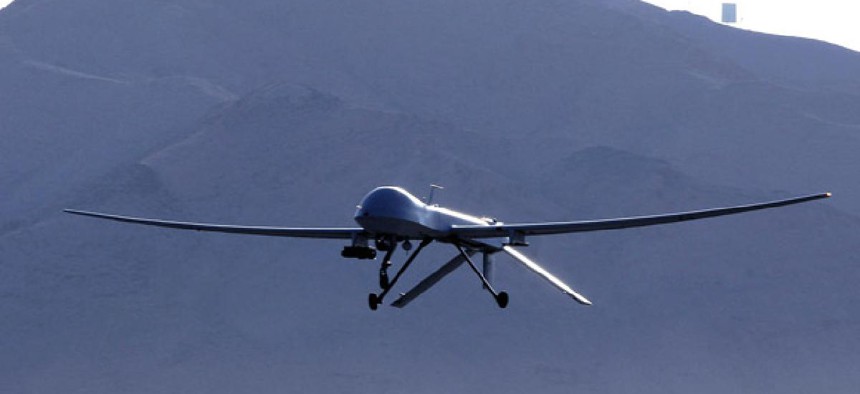Domestic drones could be hijacked or jammed, pilots and manufacturers warn

Air Force
The Federal Aviation Administration is weighing the widespread use of remotely piloted aircraft.
Pilots, aircraft manufacturers and privacy groups say the Federal Aviation Administration should ensure that drone aircraft cannot be hijacked or jammed before the agency allows their widespread use in domestic air space.
Pilots and airlines also warned FAA that plans to allow unfettered use of drones across the United States have the potential to degrade safe operations of manned aircraft.
FAA established a rule-making process in March to solicit comments on the establishment of six test sites for remotely piloted aircraft this summer and the eventual integration of drones into domestic air space by 2015, as described in the 2012 FAA Modernization and Reform Act. The agency received 224 comments by the May 8 deadline.
State and local governments and their political leaders used the comment process to promote their regions for selection as one of the six test sites. Rep. Frank LoBiondo, R-N.J., for example, urged FAA to consider the use of its William J. Hughes Technical Center at the Atlantic City airport as a test site. John “Jack” Dalrymple, governor of North Dakota, told FAA his state has the infrastructure to support a test site and “sparse air space” to ensure safe operations.
Organizations with a stake in manned aircraft operations viewed large-scale operation of drones as a safety threat FAA must manage carefully. This includes protection against hacking of data links. Aircraft manufacturer Boeing Co. said in its filing that the test site management team should have the requisite technical skills to make decisions about drone-control software and the ability to ensure “end-to-end cybersecurity.”
The Southwest Airlines Pilots’ Association told FAA that drones must be able to navigate if their GPS systems are jammed and manufacturers must include safeguards to protect against potential hijacking.
The Electronic Privacy Information Center warned FAA that “drone hacking, or the process of remotely intercepting and compromising drone operations, poses a threat to the security of lawful drone operations.”
The group also argued FAA should examine the privacy implications inherent in the “unparalleled surveillance capabilities” of drone operations and the risk that surveillance feeds could be intercepted. The agency must weigh the ability of hackers to circumvent encryption codes within surveillance software and manipulate hardware to access surveillance data, EPIC said.
The Airline Pilots Association International told FAA that plans to allow widespread operation of drone aircraft has the potential to “profoundly degrade the safety of the national air space” unless the agency manages integration of the unmanned aircraft in a “responsible, comprehensive manner.”
Airlines for America, the trade group that represents the majority of U.S. passenger and cargo airlines, told FAA that the agency “must ensure that UAS operations do not degrade flight safety or other operations” in the national air space.
The Southwest Pilots Association noted the Defense Department has collected data that shows the accident rate for unmanned systems is more than 100 times the accident rate of passenger aircraft.
The Airline Pilots Association recommended FAA require all drones either have transponders that identify them to air traffic controllers or automatic broadcast equipment that transmits location data.
Similarly, the Southwest Pilots’ Association urged FAA to require all drones operating in domestic airspace have a traffic collision avoidance system that automatically monitors space around aircraft to prevent midair collisions.
Stephen Harris, a lawyer with the Colorado Springs law firm of Alpern Myers Stuart LLC who represents a group working to protect land in southeast Colorado, argued that FAA cannot proceed with its drone test site plans until it completes an environmental impact review of each site.






